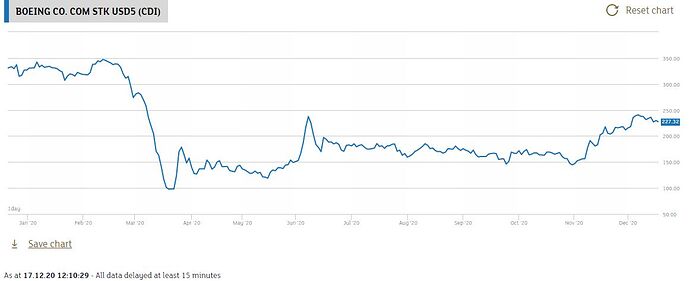The Boeing stock certainly has risen well since the approval announcements by the FAA on 18th November and by the European Union Aviation Safety Agency (EASA) on 24th November - but that doesn’t paint the full picture on the clear skies I’m afraid.
Subsequent investigations into the two major accidents that caused the 737 Max to be grounded in early 2019 showed that a primary cause in each was a software function programme known as the Manoeuvring Characteristics Augmentation System (MCAS), which was intended to make the aircraft easier to handle.
Whilst the FAA are seen, perhaps not surprisingly given the aircraft manufacturer’s provenance, to have this 737 variant back in the skies with all due haste their European counterparts are not reacting quite so speedily and have applied further conditions to their agreement.
In the USA, shortly after the FAA announcement, the Air Line Pilots Association released a statement saying it “believes that the engineering fixes to the flight-critical aircraft systems are sound and will be an effective component that leads to the safe return to service of the 737 MAX.”
However, the EASA now proposes that the changes to the aircraft design which will be required for their final Airworthiness Directive to be complied with and a clean bill of health given to the aircraft and there will also be an accompanying requirement for a mandatory training programme for the pilots, including flight simulator training before the green light is given.
Of the 387 or so aircraft from this variant type in operation back in 2019 various Chinese airlines held the largest fleets with a total of 97 planes and US airlines have the second highest figure, with 72 aircraft in service.
The next biggest customers for Boeing are Air Canada, Norwegian Air, TUI (Europe’s biggest holiday company based in Germany), FlyDubai, SpiceJet (India), WestJet (Canada) and Turkish Airlines
With such an international customer base, whilst the COVID-19 vaccine has removed some of the uncertainty in the aviation industry, the various local governmental politics relating to international travel requirements, safe travel corridors and possible vaccine passports have a lot to say in whether aviation is going to return to the mass market.
Finally, and last but most certainly not least, has to be the final end customer confidence factor to take into consideration - the passengers who will fly on these planes when they return to service.
Rumours quoting industry sources indicate that Boeing is already working hard addressing this with a probable rebranding exercise which will see the “Max” label being dropped in favour of using the plane’s formal variant names of “737 -7”, "737 -8”, "737 -9” or "737 -10”.
Prior to the grounding, and according to the Boeing order record books today, they have a total of 4,082 unfulfilled orders with a backlog of 3,333 to be delivered. In 2018 they turned a profit of $10.5 billion but the year after, primarily due to the 737 Max’s grounding in 2019 Boeing posted a loss of $636 million.
So with each of those yet to be delivered units costing an average of at least $120 million maybe, just maybe, if the prospective purchasing airlines hold their nerve (and remain aloft in these unsettled times!) by 2021-22 we might see Boeing flying back into their profit days.
I tend to keep a close eye on aviation matter as I have a vested family interest (one of my nephews is an airline pilot for a major carrier) so I would dearly like to see the industry return to some semblance of normality. Not only for that reason but also it could be seen as a litmus test for other industries and markets to improve too - here’s hoping!
